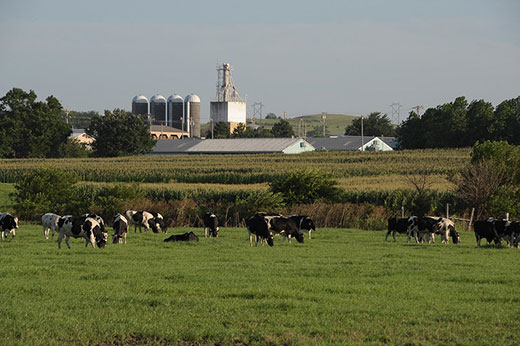
K-State cropping systems economist Terry Griffin says farmers should implement practices over time to protect farm data.
Cybersecurity on the farm
K-State agricultural economist says cybersecurity depends on location, risk preference
July 18, 2022
By Jessica Jensen, K-State Research and Extension news service
MANHATTAN, Kan. — The terms cybersecurity and cyber insurance are more than just concepts in the agriculture industry, says Kansas State University cropping systems economist Terry Griffin.
He said the agricultural industry is becoming more digital, so adaptable cybersecurity – or, the protection of computer systems from information disclosure or theft, or damage to hardware, software or electronic data -- is more important than ever.
“As a producer, we have to think about who (our) biggest threat is potentially,” Griffin said. “The Kansas farmland market is fierce, but not as fierce as in Illinois, so the biggest threat to a Kansas farmer could be seen as a different entity.”
Listen to an interview by Samantha Bennett with Terry Griffin on the weekday radio program, Agriculture Today
Griffin said cybersecurity risk depends on the location and risk preference of the farmer and who they see as their biggest threat. This could be as simple as someone getting a copy of data or insights, or data becoming inaccessible to the farmer.
“There could be solar flares that impact space weather that can adversely affect GPS,” he said. “In that event, we could be at a disadvantage during planting because there might not be row markers on the large planters anymore.”
He said such a situation can also affect harvest because farmers won’t be able to log data.
Griffin said time is of the essence when a cybersecurity breach is detected, and if farmers decide to not plant and wait a day because the GPS is down -- or they can’t control the overlaps -- it could have negative implications, such as lower yields.
There are currently no state or federal laws that cover cybersecurity for farms. Griffin suggests a couple ideas to protect farm data:
- Treat farm data as a trade secret.
- Have employees sign a non-disclosure agreement.
- Change passwords quarterly.
- Make sure when an employee leaves that their connections to farm data has been stopped.
“There are some actionable things that farm operators can do to show that their data has value,” Griffin said. “These are some best management practices for data management.”
He said farmers should build up these practices over time so that they become habit.
Griffin notes a resource to learn more about cybersecurity on the farm at HeinOnline.
Griffin’s full discussion on this topic is available on the weekday radio program, Agriculture Today.

